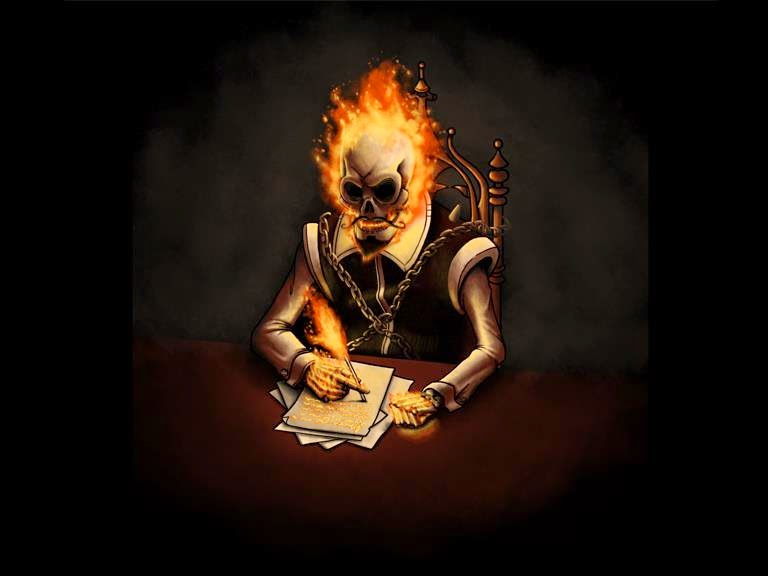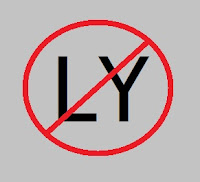See what I did there? A clever play on words. Not quite a pun, definitely not a pop culture reference, but… well, it’ll do.
It’ll do, pig.
Also, random note—I set up a Tumblr a while back. If you ever want to ask a quick question, send anonymous insults, or whatever, please feel free to stop by.
Anyway, I’m about to wrap up this draft of my current project and it struck me that I haven’t blabbed on about the drafting process, so to speak, in a while. A lot of folks hate doing drafts. Some folks skip them altogether, convinced their words are gold the minute they’re set down. And a few folks get caught in an endless loop of writing and rewriting and rewriting and rewriting and…
So, here’s a basic step by step of how I go from bare idea to something I’m willing to hand to an editor. And when I say editor, I mean “someone who will pay for these words I’ve written.” That being said, this is also a good time to bring up the ever-popular golden rule.
What works for me might not work for you,
and it almost definitely won’t work for that guy.
I’ve mentioned once or thrice before that we all have our own way of writing. Working through drafts in this way helps me a lot, but it’s not a guarantee of success for anyone except me. You might need to modify these steps a bit, or maybe a lot. But I think this is a good baseline method.
While I’m working on a book, I usually scribble down notes and thoughts about the nextbook. Characters, dialogue, action moments, reveals… all sorts of different elements. I’ll shuffle these around into more or less the order I think they’ll end up. These notes serves as a very, very rough outline, just enough so I can start writing on page one and go when it’s time to start…
The First Draft—In my mind, this is the “just finish it” stage. I just want to finish this draft with a beginning, an end, and the majority of points in between. I don’t worry about catching typos or crafting every subtle moment in the plot.
Consider this… diamonds don’t come out of the earth as clear, faceted gems. They come out as ugly blobs that need lots of cuts and polishing. So if I dig up a ten-gram diamond, I can’t expect it to make a ten gram gemstone. If I’m lucky, I might get three or four grams out of it. It’ll shrink as I work on it, because that’s how I improve it (see below). So if I’ve got a ten-gram diamond and I’m insisting on a 9.9 gram gem… well, that’s going to make a pretty crappy engagement ring, yes?
At this early stage, I don’t hold anything back. I let dialogue, descriptions, and action scenes run on a bit longer than they probably should. I know I’ll be cutting eventually, so there’s no reason to worry about length now. For this stage, it really is quantity over quality.
If I get stuck on something (an awkward conversation or complex action scene), I’ll just skip it. Things might not be perfect right now, but I know I’ll be able to go into the exact details of that conversation or this sequence later, so I’d rather keep moving forward and leave that stuff for Future Peter to deal with. Again, for me, the most important thing is to get the overall frameworkdone. It’s a lot easier to think about the little things when the big things aren’t looming over you.
Depending on the book, this process takes me anywhere from two to three months. I had one book take about six weeks, but that was pretty rare for me.
I don’t show this draft to anyone. I may take a night off, work on something else for a day, and then it’s right back for…
The Second Draft— Remember all those problems I left for Future Peter to deal with? Those need to be dealt with now. Gaps get filled in. Characters get fleshed out a little more, and sometimes renamed. All those awkward knots get worked out. Because I can see a lot of these elements in relation to the whole story now , I’ll usually find the answers to these problems are more apparent.
 The goal with this draft is to have a readable manuscript. No more little notes to myself or trailing paragraphs that need to get connected somehow. Someone should be able to pick this up and read it start to finish without thinking they lost a few pages or only got my notes on a chapter.
The goal with this draft is to have a readable manuscript. No more little notes to myself or trailing paragraphs that need to get connected somehow. Someone should be able to pick this up and read it start to finish without thinking they lost a few pages or only got my notes on a chapter. Keep in mind this doesn’t mean I do show it to people. It just means I should be able to. Really, the only person who might see this is my lady-love, and not even her always. Usually she has to wait.
For some folks, this stage would really be the first draft. Those people have nice pages of their own somewhere out there on the web. This isn’t one of them. Plus, breaking it up like this takes a lot of pressure off, which I think is a good thing when you’re trying to treat writing like a real job. No one likes a high-pressure job.
Okay then, so… now I step away for a couple of days. Maybe as much as a week. I’ll watch movies, work out a little, or maybe even scribble up a few ranty blog posts in advance. The goal is to push the manuscript as far out of my mind as possible. Don’t look at it, try not to think too much about it.
I’m just into this now with The Albuquerque Door, for those who care about such things.
The Third Draft—Time to make like a slasher and cut, cut, cut. Two great rules-of-thumb I’ve mentioned a few times—
one adverb per page, four adjectives
2nd draft = 1st draft – 10%
Yeah, the second rule goes off the previously mentioned assumption that my first clean, readable draft is my first draft.
I spend this draft tracking down adverbs, adjectives, pointless dialogue descriptors, and so on. If they can be cut, they get cut. One thing I also go after here is common padding phrases that don’t really do anything (sort of, somewhat, kind of, more or less). One of my regular readers dubbed this somewhat syndrome, and I still call it that. I like to tell myself I’ve gotten much better about it now that I’m aware of the problem.
Sometimes I also like to tell myself that I haven’t gained that much weight since college…
 At this point I’ve gone through the whole manuscript at least twice, so a few larger cuts should be apparent, too. Overcomplicated descriptions that slow down the narrative. Awkward sentence structures. Extensive character moments that really add nothing to the character, the story, or the plot. Many of these things get tightened or cut altogether.
At this point I’ve gone through the whole manuscript at least twice, so a few larger cuts should be apparent, too. Overcomplicated descriptions that slow down the narrative. Awkward sentence structures. Extensive character moments that really add nothing to the character, the story, or the plot. Many of these things get tightened or cut altogether. I spend a week or two doing this. This is usually when I let my lovely lady have a look. She’s my first set of eyes and lets me know I screwed up and I’m too close to see it.
The Fourth Draft–This is the first big polish. I go through sentence by sentence, looking for words that come up too often or stilted dialogue. I also make sure all the cuts and swaps from the last draft haven’t messed anything up. Are the logic chains still complete? Did I forget to change Pash’s name to Veek anywhere? Does Arthur still have time to get that pistol? Are there any odd character tics that I forgot to remove or add? Does the whole thing have a good flow to it?
This draft doesn’t take long. Just a day or two. It’s just one slow, careful read of the story.
Once I’ve got a solid fourth draft, I send it off to folks to get fresh eyes. I generally use four or five friends I’ve know for years. All of them are all professional writers and editors who know how to give useful criticism. Not to beat a dead horse, but by professional I mean they get paid to do this for a living. They have actual credentials.
Speaking of which, some folks might hire a professional editor at this point. Nothing wrong with that. The important thing is to get an opinion I can trust to be honest, even if I have to pay for it. A few folks might argue that this is the publisher’s job, but I need to get a publisher first, and why are they going to bother with my crap manuscript?
Anyway, this draft goes off into the world and it may be two weeks to a month before I look at it again. The challenge is to resist messing with it while those people are looking at it. I try to spend the time relaxing a bit, scribbling down ideas for later books (see above), or flexing different mental muscles.
More than once, I’ve cleaned my office.
The Fifth Draft— Now I’ve gotten notes back from the folks I begged/ blackmailed/ paid to read this thing. I go through the whole manuscript page by page with their comments. If you’ve got multiple monitors, this is a great time to use them.
 Page one… what did everyone think? What about page two? How’s page three look? As I’m doing this, I’ve also got my own copy of the fourth draft that I’m using as a “master document.” This way I can see all the notes and make whatever changes are required.
Page one… what did everyone think? What about page two? How’s page three look? As I’m doing this, I’ve also got my own copy of the fourth draft that I’m using as a “master document.” This way I can see all the notes and make whatever changes are required. I mentioned that I ask four or five people to make notes for me. That gives me a broad sampling on each note/ issue that comes up. If four people like something but one doesn’t, odds are I’ll call that good. Nothing’s going to work for everyone. If three don’t and two do (and of course I do, or I wouldn’t’ve written it), I’ll sit and give it a good look. If nobody likes it, well… I’m smart enough to admit when I’ve screwed up and something doesn’t work.
This draft can take another two weeks or more to finish with a full book manuscript.
The Sixth Draft— This one’s another polishing draft, just like the fourth. I need to make sure everything still works now that I’ve made those changes and tweaks from my reader’s comments. So, yet another line by line reading, adjusting as I go.
And at this point… this is when I’m done. There’s only so much a given writer—in this case, me—can do with a given story. There comes a point when further work accomplishes nothing and I’m just rewriting for the sake of rewriting. I’m sure we all know someone who’s just been working on the same manuscript for years and years because they’ve got another one or two drafts to put it through. If my manuscript’s not ready for a publisher (or film producer) by now, it probably means I screwed up something big right at the start.
Maybe with my initial idea of rebooting the Laff-A-Lympics as a medical drama starring a gender-swapped, alcoholic Captain Caveman.
Next time… well, if there’s anything next week it’ll be really quick. I’ve got a flight on Thursday. If you’re in Dallas next week, please swing by Texas Frightmare and say hi. I’ll be in the Made in Texas room.
Either way, go write.







